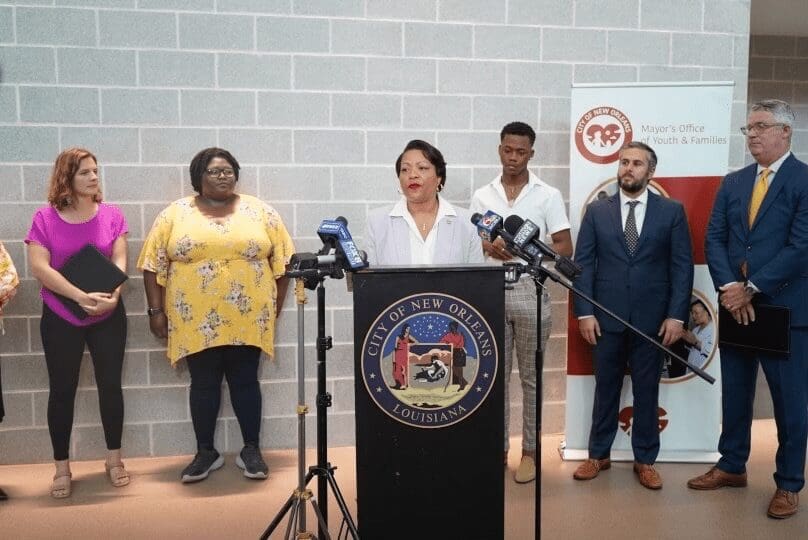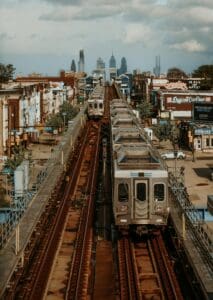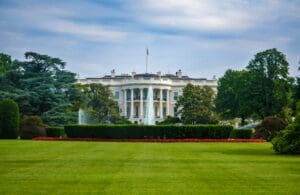By: Roby Chavez.
See original post here.
New Orleans has launched a first-of-its-kind program that provides monthly payments to teens as young as 16 years old.
For the next 10 months, 125 participants ages 16 to 24 will get $350 a month with no strings attached as part of a new guaranteed income program. Participants can spend the money any way they like, and city officials hope it will help them understand the needs of young people experiencing poverty and income inequality, a group often overlooked by social safety nets.
The plan is to lift up some of the city’s 6,820 “opportunity youth,” or young people disconnected from work or school despite graduating high school.
“If we want to save the city, it’s about investing in our young people, filling in the gaps where we know resources are needed so that we can give them a path to making better decisions that will impact all of our lives,” New Orleans Mayor LaToya Cantrell said in a news conference Tuesday.
In December, when the mayor first announced the pilot program, she said in a statement that many residents needed urgent help with basic needs.
“Nothing helps a struggling family like money in the pocket, and nowhere is that more apparent than among Black Americans — who are more likely to be unemployed but less likely to get unemployment benefits.”
While critics of these kinds of social services programs call them a handout, in part because there are no work requirements, advocates point to research that supports direct cash payments as the most effective way to fight poverty, in part because people can direct it toward what they need with fewer bureaucratic hurdles and without drawing from multiple kinds of assistance programs.
The first thing Jerred Franklin, 20, bought was food. He got his first check along with the other program participants on April 29. He still thinks “it is too good to be true.”
“No one’s ever given me free money other than my parents. There’s always a catch,” said Franklin, who lives with his parents and has struggled to find a steady job since graduating high school in 2019.
“When I first got it, I took some friends out to get food, and then I bought some food and other things for the house, and I paid my phone bill,” Franklin said. “It was a huge help. I am always worried about not being able to pay a bill and not knowing where I’m going to get the money from or who was going to step up to help me.”
What does the guaranteed income program do?
Guaranteed income is a monthly cash payment intended to provide financial stability for those who don’t earn enough to meet basic needs. There are no work requirements, and participants can spend money in any way that makes the most sense for themselves and their families.
In New Orleans, 74 percent of people considered “opportunity youth” by the city have no income at all, 87 percent are African American, and 55 percent are male, according to data provided by the mayor’s Office of Youth and Family Services. The program includes participants from the juvenile justice system, alternative high schools, pregnant women and new mothers, unhoused youth and young immigrants.
In New Orleans, like in other cities, anonymous aggregate data from the electronic debit cards recipients use to access the money will be tracked to identify spending patterns. Participants will receive payments every four weeks and will help with research data by filling out an anonymous survey every five months, and 40 of the participants will do a qualitative interview with researchers.
Franklin said he realizes most people will think young recipients will waste the money. He sees it differently.
“I see it as more of an opportunity to do what you want to benefit myself and my family,” said Franklin, who is currently unemployed but has worked in retail and at a warehouse.
Franklin described how there have been moments when he didn’t have money.
“Knowing you need something and not having it is frustrating because you need it, and you just can’t get it,” he said. “Now, you can put money on the side so you can have it when you’ll eventually need it.”


The first trial program was started in Stockton, California, in 2019. Early data from the Stockton pilot showed nearly 40 percent of the money was spent on food, 20 percent was spent on buying household items, 10 percent on transportation (gas, car repair, bus passes), and 10 percent on utilities.
New Orleans is one of three cities in the South – Shreveport, Louisiana, and Birmingham, Alabama, being the other two – to recently start up guaranteed income programs.
Interest in these types of universal basic income programs has grown since the pandemic. Currently, there are 20 pilot programs funded by $500,000 grants from the Mayors for Guaranteed Income program (MGI). Twenty more are expected before the end of the year. MGI is a network of 80 mayors advocating for a guaranteed income, and it is funded by mostly private capital. Each program has a different focus population.
“We see guaranteed income as a way to make sure all families have an income floor that they don’t fall below. We’re using it as a tool for racial and gender equity, and we are really trying to close the income gap that exists,” MGI executive director Sukhi Samra told the NewsHour. “The pandemic really highlighted how close American families are to financial insecurity. It’s just one pandemic, and it’s losing one paycheck, one medical bill that can take someone from being stable and being able to make your bills to complete financial ruin.”
Nearly 40 percent of Americans cannot afford a single $400 emergency, according to a 2018 Federal Reserve survey. It’s one of the factors used to help calculate the amount of monthly payments.
“We’ve heard from some people already. They are using it to support child care expenses, get medicine filled, buy food.”
While critics claim participants in the program use the money to buy non-necessities or as an excuse not to work, Emily Wolff, who heads up the New Orleans Guaranteed Income Program, said she “rejects the idea that this is a handout,” adding that it will help those who live in an “ongoing state of crisis.”
“We’ve heard from some people already. They are using it to support child care expenses, get medicine filled, buy food, and one new mother used it for transportation to get her 10-month-old to a doctor,” said Wolff, director of the mayor’s Office of Youth and Families. “It is an emergency, and it continues to be an emergency.”
Samra said these programs give young people and historically marginalized communities the breathing room to plan for their needs.
“Our hope is that when you flip the paradigm, and you give people cash unconditionally and no strings attached, then they’ll see the government is willing and able to invest in them, and that starts to encourage them to engage a bit more,” Samra said.
Samra said the programs help collect information on whether guaranteed basic income helps push people to access full-time or part-time employment or allows folks to go back to school and complete their education. The data collection will “help us understand if a guaranteed income can be a bridge back to services,” she said.
Cities have the freedom to do what they want with grants. They must serve at least 100 people, but the amount and length of cash payments are up to each location. New Orleans’ $350 payments are much less than other cities. Other programs, like one in Mississippi, give working Black mothers in Jackson $1,000 a month, and in Stockton, California, participants got $500 a month.
Does it work?
Now that the money is being handed out, the biggest question is – will it work?
The Center for Guaranteed Income Research at the University of Pennsylvania will study what happens to people enrolled in the pilots and release its findings. Advocates hope it leads to the creation of a federal guaranteed income program.
WATCH: Stockton, California, gave residents a guaranteed income. Here’s what happened
Apart from the individual benefits a family will receive, advocates hope the pilot programs will also increase the amount of data that can be used to create community-driven poverty solutions.
Wolff said the feedback is already encouraging across the city where 32 percent of Black residents live in poverty. While the program “is not a silver bullet,” she said, “it is something that can help give young people something to take care of themselves and their families.”
“Why would we continue to keep doing the same thing when doing the same thing has been such an utter failure?”
Those tracking the data in New Orleans say the area needs a guaranteed income as the city continues to struggle with devastating hurricanes, the ongoing pandemic, a lack of affordable housing, and high poverty rates, not to mention the day-to-day struggles of everyday life, like having a car break down.
“Those kinds of emergencies can really put people deeper into poverty,” said Jack Shaevitz, deputy director of policy in the mayor’s Office of Youth and Families. “The ability to use this money to really withstand everyday occurrences that for low-income people can be really difficult and potentially catastrophic.”
The city relied on nine community programs, charter schools, and nonprofits to refer at-risk youth to the program. Some participants came from the Louisiana Center for Children’s Rights (LCCR), which functions as a public defender for 90 percent of the young people prosecuted in New Orleans, estimated to be 500 to 700 youth each year.
“It made sense to us because it trusted our young people to make decisions. It also starts by asking and answering the question, what do the most vulnerable youth of New Orleans need, and how can we invest in them,” LCCR executive director Aaron Clark-Rizzio said. “At the end of the day, we need to be forming better relationships with the children and our teenagers in our city. They feel a profound sense that they are excluded from our community and our city.”
Clark-Rizzio said the money could ideally help stabilize their clients in moments of crisis.
“It’s best understood as a building block,” he said. “In that way, it could be huge.”
For Clark-Rizzio, the question shouldn’t be whether the city should do this new guaranteed income program. “It should be: ‘Why would we continue to keep doing the same thing when doing the same thing has been such an utter failure?”
________________________________________
About the Author: Roby Chavez is a Communities Correspondent for the PBS NewsHour out of New Orleans. @RobyChavez_504




















